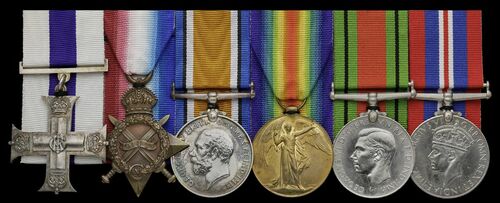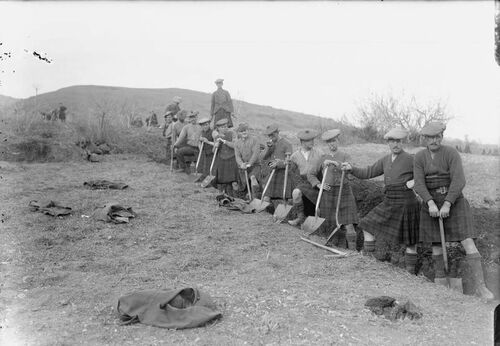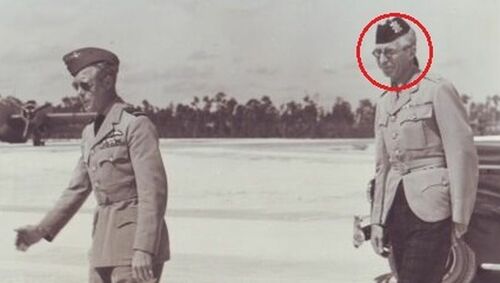Auction: 23001 - Orders, Decorations and Medals
Lot: 351
(x) The superb Great War Salonica M.C. group of six awarded to Major E. G. M. Phillips, 10th Battalion, Royal Highlanders (Black Watch), who become Comptroller to H.R.H. the Duke of Windsor (King Edward VIII)
During the Fall of France the responsibility for evacuating the Duke and his during the fall of France; staying by his side throughout the war Phillips joined him in the Bahamas, being censured for a communication with Fascist Italy and finding himself involved with the murder of Sir Harry Oakes
Military Cross, G.V.R., unnamed as issued; 1914-15 Star (2. Lieut. E. G. M. Phillips. R. Highrs); British War and Victory Medals (Capt. E. G. M. Phillips); Defence and War Medals 1939-45, mounted court-style, good very fine (6)
M.C. London Gazette 1 January 1918.
Edwin Gray Moneylaws Phillips was born at Kirklington, Nottinghamshire on 11 October 1884, the son of John Phillips of Earl's Hill House. Sent to Eton he excelled as a Classicist, matriculating to Magdalen College, Oxford, where he studied between 1903-1907 before moving on to train at the Inns of Court.
The Great War
With the outbreak of the Great War, Phillips' career was to be put on hold and he was commissioned 2nd Lieutenant with the Royal Highlanders (Black Watch) on 3 December 1914. Serving in France in 1915 Philips served with the 10th Battalion, Royal Highlanders and embarked for France in September but did not stay long, being transferred to the Salonika Front in November. Promoted Lieutenant on 7 June 1916, Phillips notably commanded a trench raid carried out by men of 'A' Company, 10th Battalion against the P5 feature on Pip Ridge near Lake Doiran on 9 October 1916. He is likely to have seen this feature a good deal more, not least when the Battalion was engaged at the disastrous Battle of Doiran. Phillips again served with 'A' Company and performed well - however he was lucky to survive the battle unharmed, with five officers killed and another six wounded.
Appointed Adjutant on 15 October 1917, Phillips was promoted Captain just ten days later, likely as a result of his leadership in the battle as well as due to the high losses amongst the officers. He was awarded his Military Cross not long later, being presented with it by Lieutenant-General Sir George Milne on 20 March 1918. Meanwhile, high losses on the Western Front led to the Battalion being transferred back to France in June 1918. Phillips was not to remain with them for long however, being transferred to the 8th Battalion on 27 October 1918.
Inter-War & Comptroller to the Duke of Windsor
Taking occasional work as Comptroller for the Duke of Sutherland, during this time Phillips was to meet the Duke of Windsor. Commissioned again at the outbreak of Second World War, he was posted to the Duke's staff as Comptroller; at this time the Duke was part of the British Military Mission in Paris. Despite this he was considered to be something of an outsider and extraneous to the war effort.
As the German advance gained momentum the Duke withdrew to the rather safer and more comfortable Cote D'Azur, leaving Phillips and 'Fruity' Metcalfe in Paris; here they minded the his residence in the Boulevard Suchet - not that they had a choice as he had taken all of the cars with him upon leaving - Metcalfe left soon after, disgusted by his master's abandonment. With the fall of the Weygand Line even Phillips left Paris, hitch-hiking south through war-torn France. Exhausted and starving he described the collapse of the French army to his hosts upon arrival. The British could spare no ships to evacuate the Duke and Duchess and so they remained in the south of France occasionally visiting the Italian front. This changed when the Italians declared war on 10 June: with Petain taking control of France and requesting an Armistice the Germans were only 200 miles from the Duke and his staff, including Phillips, with nothing to stop them.
It was time to leave, frantic arrangements were made between the British Consuls still in France and it was decided that the Duke's party would join Major Dodds - the Consul at Nice - in driving to the Spanish Border. Arriving at Perpigan only 10 miles from the border they prepared to bed down for the night, King Edward VIII - The Official Biography takes up the story:
'There they planned to spend the night, but they had hardly reserved rooms before the Mayor in great excitement arrived to report that the entire French Government would arrive at any moment, that the town would probably be bombed by the Germans, that the Duke and his entourage must move on. After protracted haggling visas were obtained for the entire party, and at 7pm they crossed into Spain. Wearily they journeyed on; it was midnight before they found temporary refuge in a hotel in Barcelona. The next stage of the Windsor's exile had begun.'
Safe in Spain here began the wrangling for his new position, one eventually being found - the Governorship of the Bahamas. This posting was far enough away that he would be in no danger, either from the war or of being involved in Government decisions. Meanwhile German intelligence agents were working to try and subvert the Windsors before they could return to British territory. Phillips was sent to London to gather the Duke's Colonial Office briefing and settle any questions of etiquette that would arise.
While he was there another contentious issue arose - that of Piper Alistair Fletcher, the Duke's previous Valet, now required for war service. As it was felt that the Duke would be handicapped by the loss of his Valet just before a new appointment he telegrammed Phillips to arrange a meeting with Winston Churchill himself to discuss it. Despite the pressures of the war and the burgeoning Battle of Britain, Churchill did in fact meet Phillips but he rejected the suggestion that Fletcher be allowed to stay on as Valet.
Meanwhile yet another issue had arisen, that of the route the Royal couple should take to the Bahamas. The Duke wished to go via New York, largely to allow the Duchess to see a doctor in the City. When the Government vetoed the idea partly because they felt a visit 'of an icy character and will have a most unfortunate effect at the present Juncture' - but also because 'it was feared that the Duke, ever popular in the United States, might contact isolationists and appeasers'. The Duke was furious - so much so he even wrote a letter resigning his post, thought it went unsent - and Churchill, seeing this anger, relented a little by releasing Fletcher back to his role as valet. Phillips, Fletcher and Sir Walter Monckton flew to Lisbon where the family was now based.
Exile in the Bahamas
Meanwhile in Lisbon, German attempts to suborn the Duke were stepped up but despite this he remained uncommitted. These culminated in a list of the passengers on the ship Excalibur being leaked to Phillips with the names of Jews aboard marked as though they formed a threat. Despite a last-minute request of the Duke that the vessel be held for a week, the British Government were determined to have him safely out of the way and she sailed as planned on 1 August 1940.
The Windsors did not enjoy the Bahamas, in the Duchess' own words '...we both hate it and the locals are petty-minded, the visitors common and uninteresting'. However they did make one friend - though they were later to have cause to regret doing so - that being the gold mine owner and investor Sir Harry Oakes. It was not long after he had moved into the Governor's residence that Phillips committed an unusual act which caused great consternation on the part of British Intelligence and the Duke himself. The intelligence services intercepted a letter sent from California by Mona Williams - a friend of the Duchess - to a close friend in Rome. While this was deemed innocent enough, attached to the letter was a postcard of Government House, Nassau signed 'Griglio' - Italian for grey - and addressed to Prince Rodolfo del Drago. This unusual communication aroused a whirlwind of activity, it was vital that they discover who this 'Griglio' was and how he was connected to the Italians - and more importantly the Duke.
Copies of the letter were studied all around the world, by the spymaster 'Intrepid' in New York and the Secretary of State and the Colonial Office in London. It was not until April 1942 that the Duke was approached for information on the matter, though it was made clear that no harm had been found it the letter itself. The Duke replied:
'I am writing to inform you that I have established the identity of GRIGIO as being Major E. Gray Phillips, a member of my personal staff in Nassau. Major Phillips has made a full confession of his blatant infringement of the regulations...the seriousness of which is aggravated by the fact...my name should become connected with the incident...For my part, I am entirely satisfied with his explanation of this incident and that his endeavour to communicate with an Italian was in no way prompted by any sinister motive...Having known Major Phillips for twenty years, the last three of which he has held an important position of trust as my Comptroller, I can vouch for his integrity. I hope, therefore, that under the circumstances British Security Co-ordination will...overlook the serious breach of security regulations which he has unfortunately committed.'
Phillips was cleared and the affair was soon overshadowed by a far greater crime which rocked Bahaman society. Sir Harry Oakes was murdered some time after midnight on 8 July 1943 and his body mutilated to disguise the wounds. It was Phillips' grim duty to inform the royal couple of the demise of their friend. Worse yet as Governor it was the Duke's responsibility to respond to the crisis; his bungled handling of the incident cast a pall over his time as Governor.
Retirement
The Windsors returned to their home at La Cröe, France in April 1946 and in December Phillips left their employment. He was to return to the Bar for some time before retiring to Melton Court, Old Brompton Road, London where he died on 26 January 1973; sold together with copied research comprising, a Magdalen College Honour Roll, passenger list and Army Lists as well as M.I.C., London Gazette entries and medal rolls along with war diary extracts and a Brewery History blog post.
Subject to 5% tax on Hammer Price in addition to 20% VAT on Buyer’s Premium.
Sold for
£1,200
Starting price
£950









